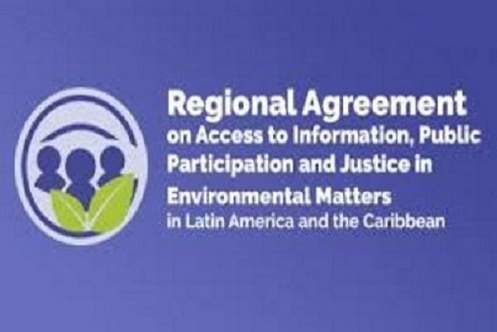GENEVA, Switzerland (CMC) — United Nations human rights experts are urging Caribbean countries to sign and ratify as quickly as possible, the Escazú agreement, described as a ground-breaking environment treaty for the region.
The Economic Commission for Latin America and the Caribbean (ECLAC) said that the Regional Agreement on Access to Information, Public Participation and Justice in Environmental Matters in Latin America and the Caribbean was adopted on March 4 in Escazú, Costa Rica, and will be open for signature on September 27 at the UN General Assembly in New York.
The treaty is the first of its kind in the world to include specific binding provisions for the protection and promotion of people, groups and organisations that promote and defend human rights in environmental matters, ECLAC said.
It said the treaty, which was negotiated under its auspices, is the only binding treaty stemming from the UN Conference on Sustainable Development (Rio+20).
“This landmark regional treaty not only guarantees good governance and basic democratic rights but is also an enabler for environmental protection and sustainable development,” the 27 UN experts said in a joint statement.
“There is a special emphasis on people and groups in vulnerable situations and measures to try to help those most in need. We welcome the focus in this treaty on overcoming the barriers and difficulties that hinder the full enjoyment of human rights related to the environment, which is especially crucial in Latin America and the Caribbean,” the experts continued.
They also praised the treaty’s explicit recognition of the rights of indigenous peoples, as well as the acknowledgement of the cultural diversity of Latin America and the Caribbean and of their peoples.
The Special Rapporteur on human rights and the environment, David R Boyd, drew particular attention to Article 1 of the treaty, which recognises everyone’s right to live in a healthy environment.
“This agreement is a major leap forward in the protection and safeguarding of human rights defenders in environmental matters,” said Michel Forst, the Special Rapporteur on the situation of human rights defenders.
“By establishing specific binding provisions, Latin American and Caribbean States are not only recognising the acute and alarming situation faced by environmental defenders in countries of the region but are also taking concrete steps to reaffirm their role and respect, protect and fulfil all their rights,” he added.
ECLAC said provisions in the treaty aimed at ensuring access to information and justice, in the various languages used in each of the countries, and fostering public participation and cooperation were also welcomed by the UN experts.
“In keeping with international human rights obligations, the regional agreement sets important standards that will be fundamental in addressing some of the world’s most pressing challenges such as climate change, land degradation, water pollution, natural disasters and the depletion and unsustainable use of natural resources,” the experts stressed.
The experts added that States should adopt, in their strategies for achieving the UN’s Sustainable Development Goals, an approach that encompasses the whole of society.
They also pointed out that an essential aspect of States’ international human rights obligations is to ensure protection, respect and support for individuals who raise concerns about adverse human rights impacts, including climate-induced displacement and in the context of development projects where business is involved.
“This approach would allow everyone, particularly those in more vulnerable situations – including older persons, access to timely and reliable information, so that they could participate meaningfully in decisions affecting their lives, and seek redress and remedy when their rights have been infringed,” the experts said.
“By signing and promptly ratifying this ground-breaking treaty, Latin American and Caribbean States will reinforce their strong commitment to environmental protection and human rights and, above all, will send out an unequivocal message in favour of multilateralism, solidarity, equality and regional integration, while encouraging partnerships with other regions,” they added.
In following up on the agreement, ECLAC said States should also ensure that business activities and investments do not come at the cost of adverse environmental and human rights impacts.
In implementing the agreement, ECLAC said States should also be mindful of the varied and disproportionate impact of environmental matters on women and girls, and the specific challenges faced by women human rights defenders, and ensure that all actions taken incorporate a gender perspective.
ECLAC said the regional agreement is open for signature by the 33 countries of Latin America and the Caribbean, and requires a minimum of 11 States to become operational.

